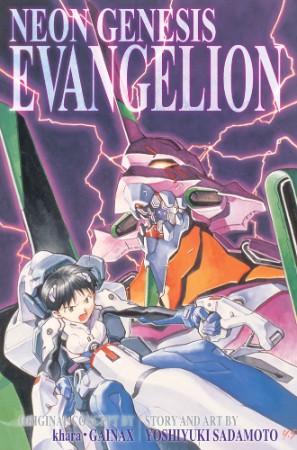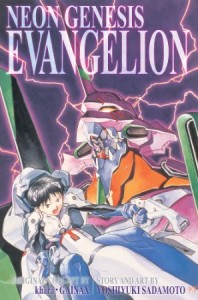By Yoshiyuki Sadamoto and GAINAX. Released in Japan by Kadokawa Shoten, serialized in the magazine Shonen Ace. Released in North America by Viz Media.
In a not-entirely-coincidental move, Viz has released the first of their omnibus releases for Evangelion at the same time as Vol. 13, giving the reader a chance to catch up and remind themselves of what they may have forgotten. And it’s definitely possible that they forgot, as the manga began in 1995, and Viz started releasing it in 1998 or so, in 32-page comic book format (remember when they did that?) and flipped (remember when they did that?). But now it’s decades later, and it’s time to get the band back together again with this new oversize omnibus with color pages and snazzy packaging. (Which is well worth it, by the way, it looks great.) But what about the content?
Given I only reviewed Vol. 13 of Evangelion last week, there may be some repetition involved. But the main reason I tend to prefer the manga adaptation of Evangelion to the anime is that it takes the basic plot and makes everything just slightly more tolerable. And indeed, in these early volumes, it is pretty slight – there are no major changes from what we watched in the first 6 episodes or so of the anime. For those living in a cave, Evangelion starts off as a post-apocalyptic giant robot sort of story where a young teenager estranged from his father is called to a super secret base to find out that he’s one of the few people who can pilot said giant robot and defeat the enemy creatures that keep attacking the Earth. Only the creatures are Angels, and that’s not merely Japan’s love for using religion where it’s not appropriate – Evangelion is drenched in religion, with each enemy angel having an appropriate name – Sachiel, Shamshel, Ramiel, etc.
Shinji in particular benefits from the adaptation to manga. He still complains quite a bit, and still runs off halfway through the volume, but his general demeanor is more argumentative and sullen rather than weak and whiny, and it simply makes the reader identify with him better. Indeed, his reasoning for running off is given better depth in the manga – he’s desperately searching for a family/parental figure, and finding that the closest one he now has, Misato, has been writing a journal for NERV analyzing him is a crushing blow. His response to Touji is also excellent – some may object that it shows Shinji being too ‘cool’, but I like to think that it shows Shinji as being slightly less broken.
There’s also Shinji’s relationship with Gendo, and his observation of Rei’s relationship with Gendo. I’ll admit I’m not all that fond of Gendo, and the manga doesn’t help – he’s the one character who’s actually less appealing than in the anime. But seeing his interactions with Rei must deal Shinji’s fragile psyche a crushing blow, wondering what in God’s name is wrong with him if he can’t get any sort of affection from his father but she can. Of course, this isn’t Rei’s fault, and it’s to his credit that he’s able to bond with her as well. The three volumes are roughly divided into Shinji’s relationship with another person – Gendo in Vol. 1, Misato in 2, and Rei in 3. The climax to 3, where Shinji manages to coax a genuine smile out of Rei,l is wonderfully heartwarming, and a great place to end this omnibus.
If you haven’t read the manga yet, this is absolutely a worthy release to get, showing why it’s become one of the most important stories from the last thirty years.
Also, Page 234 has to be read to be disbelieved. Sometimes an Angel is not just a cigar, I guess. And Misato’s dialogue is just icing on the cake.


Pingback: MangaBlog — Barefoot Gen creator Keiji Nakazawa passes away
Pingback: Items About Books I Want to Read, #45 | Alchemical Thoughts